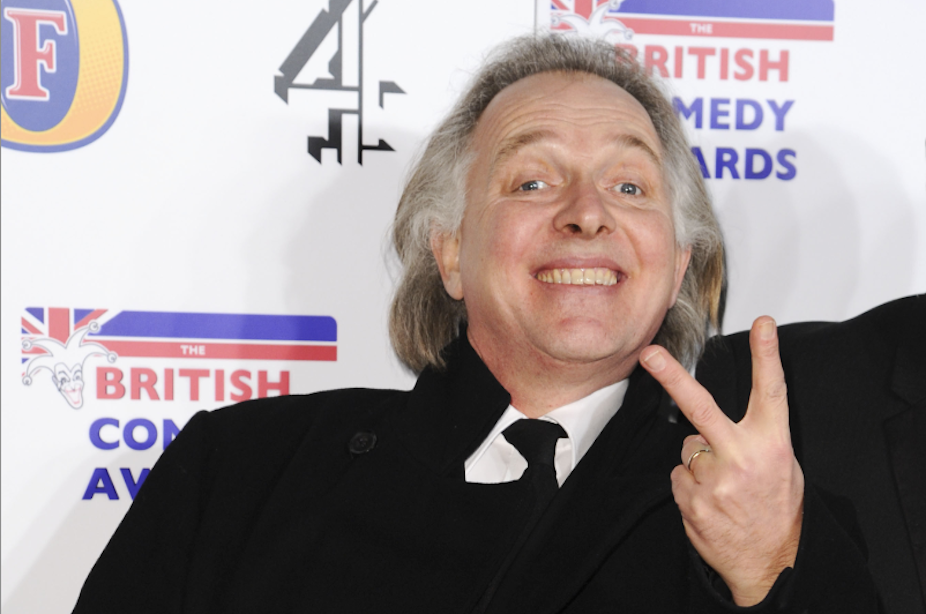Rik Mayall is putrid – absolutely vile. He thinks nose-picking is funny and farting and all that. He is the arsehole of British comedy.
Spike Milligan made this rather pithy statement some time ago (the exact date is not known, though the quote appears in numerous places), it serves as a rather succinct summary of Rik Mayall’s place in Britain and British comedy.
To me, Mayall – who died yesterday – was more commonly known as “a right bastard”, but I’m sure he was quite pleased with “arsehole” and “vile” as well.
I was too young to watch The Young Ones (1982-84) when it was originally broadcast. I encountered it with my first long-term boyfriend, a formerly-mohawked soon-to-be-chemical-engineer, who served alongside me on the university student guild. At first, I found the show rather childish. Its only redeeming feature, as far as I was concerned, was the maniacal yet boyish giggles it managed to elicit from my boyfriend.
Annoyingly, it started to elicit those giggles from me.
In The Young Ones, Mayall played “Rick”, a student anarchist who was “young, pretty and had 5 O Levels” (Bloomin’ good grades, considering he didn’t do a sod of work ’cause he’s so hard). Rick was an affront to good taste and proper English values. He downright refused to adhere to the prevailing conservative discourse of the time, and took any chance he could to get “stuck in” to Thatcher.
Rick was a representation of the anarchist that conservatives had learnt to despise and even fear since Sid Vicious and Johnny Rotten brought anarchy to the UK in the late 70s. For the youth of Thatcher’s Britain, he was a revolution.
Jamie Reed, UK Labour MP and Shadow Minister for Health, credits Mayall as his inspiration to go to university and get into politics:
There was nothing like The Young Ones and nobody like Rik Mayall. For me and my friends, he taught us dissent – the same spirit that drove rock and roll decades before.
Yet, as Mayall taught dissent, he simultaneously served as a harsh satire of the punk movement. The character of Rick was a pompous and ignorant caricature of the faux-anarchist students of the time. In comedian and Young Ones co-writer Ben Elton’s words, Rick was a “desperate wanna-be-leftie”:
a two-year anarchist whose dad is probably a bank manager and he’ll probably end up one too.
In The Young Ones, Mayall flicked the V-sign at as many punks as he did conservatives.
Initially, Mayall’s character in The Young Ones struck a little too close to the bone for me. I was a student unionist in my late teens when the Howard government introduced a 25% increase in HECS and abolished Universal Student Unionism. I believed student protest could solve anything and became increasingly disillusioned when it could not.
Though I was perfectly reasonable when dealing with academic staff, even wearing my mum’s slightly-too-long pant suits to university committees in an attempt to appear professional, I had been known to throw the words “Hilter” and “fascist” around whenever right-leaning politicians came on the TV. I was a Young One, albeit a significantly toned-down version.

But in subsequent years Mayall’s political satire left the punks behind. Mayall remained a truly vile character in all his work: screaming, bulging, farting, swearing, and flailing into any situation. The master of the V-sign, a king of slapstick, he continued and extended Britain’s long-serving tradition of grotesque humour.
Much of this tradition existed in the realm of euphemism; Mayall and his many contemporaries brought it into the physical body. His satire, however, became decidedly more left-wing.
While The Young Ones may have sparked a wave of alternative comedy, it was The New Statesman (1987-92) that really went for Thatcherism’s jugular. Mayall played Alan B'Stard, an ultra-conservative, ultra-sleazey backbencher that caricatured the worst the Torys had to offer in the final years of Thatcher’s Prime Ministership.
Mayall once described B’Stard as Peter Mandelson and Alastair Campbell rolled into one. The fact Mandelson and Campbell were Labour figures was not missed by Mayall; he saw Tony Blair as so right-wing he could have been Alan B'Stard’s hero.
This was the Rik Mayall I liked, the real conservative bastard. I felt I was missing something with The Young Ones – did my boyfriend and fellow student activists not realise that they were the butt of the joke?
Last night, upon hearing of Mayall’s death, I took to YouTube and re-watched old clips of his comedy. I found myself ignoring The New Statesman clips, opting for the mischief in The Young Ones.
Perhaps this old student activist had developed a sense of humour. Perhaps I’d come to realise that, in fact, I had been a bit of bastard in those days (or pRick, as his flatmate Vyvyan would say).
This revelation made me realise one of the often overlooked qualities of The Young Ones and, indeed, satire in general. Good satire should always have a critical edge, revealing and ridiculing hypocrisy.
The best satire is prepared to reflect back on itself, exposing the complexities and hypocrisies even in its own position. The Young Ones, like Mayall himself, was a chaotic hodgepodge of putrid for putrid’s sake and biting timely satire. It managed to be simultaneously subversive and conservative for different people.
While Mayall was as left as they come, he was also aware that there were arseholes on both sides of the house.

